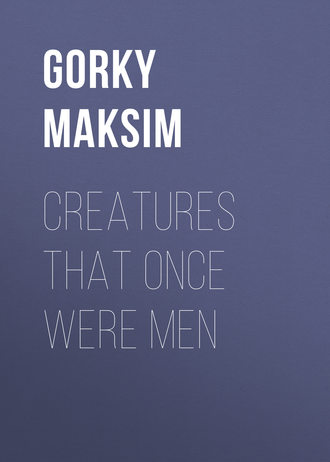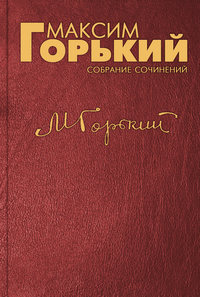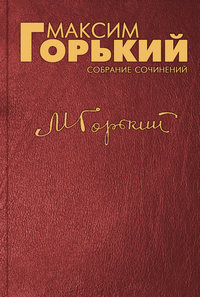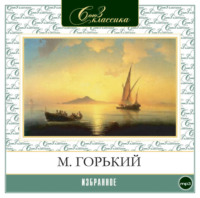 полная версия
полная версияCreatures That Once Were Men
The sea had waked up. It frolicked in little waves, bringing them forth, decking them with a fringe of foam, flinging them on one another, and breaking them up into tiny eddies. The foam, melting, hissed and sighed, and everything was filled with the musical plash and cadence. The darkness seemed more alive.
"Come, tell me," began Chelkash, "you'll go home to the village, and you'll marry and begin digging the earth and sowing corn, your wife will bear you children, food won't be too plentiful, and so you'll grind away all your life. Well? Is there such sweetness in that?"
"Sweetness!" Gavrilo answered, timid and trembling, "what, indeed?"
The wind tore a rent in the clouds and through the gap peeped blue bits of sky, with one or two stars. Reflected in the frolicking sea, these stars danced on the waves, vanishing and shining out again.
"More to the right!" said Chelkash. "Soon we shall be there.
Well, well! It's over. A haul that's worth it! See here.
One night, and I've made five hundred roubles! Eh? What do you say to that?"
"Five hundred?" Gavrilo, drawled, incredulously, but he was seared at once, and quickly asked, prodding the bundle in the boat with his foot. "Why, what sort of thing may this be?"
"That's silk. A costly thing. All that, if one sold it for its value, would fetch a thousand. But I sell cheap. Is that smart business?"
"I sa – ay?" Gavrilo drawled dubiously. "If only I'd all that!" be sighed, recalling all at once the village, his poor little bit of land, his poverty, his mother, and all that was so far away and so near his heart; for the sake of which he bad gone to seek work, for the sake of which he had suffered such agonies that night. A flood of memories came back to him of his village, running down the steep slope to the river and losing itself in a whole forest of birch trees, willows, and mountain-ashes. These memories breathed something warm into him and cheered him up. "Ah, it would be grand!" he sighed mournfully.
"To be sure! I expect you'd bolt home by the railway!
And wouldn't the girls make love to you at home, aye, aye!
You could choose which you liked! You'd build yourself a house.
No, the money, maybe, would hardly be enough for a house."
"That's true – it wouldn't do for a house. Wood's dear down our way."
"Well, never mind. You'd mend up the old one. How about a horse?
Have you got one?"
"A horse? Yes, I have, but a wretched old thing it is."
"Well, then, you'd have a horse. A first-rate horse!
A cow – sheep – fowls of all sorts. Eh?"
"Don't talk of it! If I only could! Oh, Lord! What a life I should have!"
"Aye, mate, your life would be first-rate. I know something about such things. I had a home of my own once. My father was one of the richest in the village."
Chelkash rowed slowly. The boat danced on the waves that sportively splashed over its edge; it scarcely moved forward on the dark sea; which frolicked more and more gayly. The two men were dreaming, rocked on the water, and pensively looking around them. Chelkash had turned Gavrilo's thoughts to his village with the aim of encouraging and reassuring him.
At first he had talked grinning sceptically to himself under his mustaches, but afterward, as he replied to his companion and reminded him of the joys of a peasant's life, which he had so long ago wearied of, had forgotten, and only now recalled, he was gradually carried away, and, instead of questioning the peasant youth about his village and its doings, unconsciously he dropped into describing it himself:
"The great thing in the peasant's life, mate, is its freedom! You're your own master. You've your own home – worth a farthing, maybe – but it's yours! You've your own land – only a handful the whole of it – but it's yours! Hens of your own, eggs, apples of your own! You're king on your own land! And then the regularity. You get up in the morning, you've work to do, in the spring one sort, in the summer another, in the autumn, in the winter – different again. Wherever you go, you've home to come back to! It's snug! There's peace! You're a king! Aren't you really?" Chelkash concluded enthusiastically his long reckoning of the peasant's advantages and privileges, forgetting, somehow, his duties.
Gavrilo looked at him with curiosity, and he, too, warmed to the subject. During this conversation he had succeeded in forgetting with whom he had to deal, and he saw in his companion a peasant like himself – cemented to the soil for ever by the sweat of generations, and bound to it by the recollections of childhood – who had wilfully broken loose from it and from its cares, and was bearing the inevitable punishment for this abandonment.
"That's true, brother! Ah, how true it is! Look at you, now, what you've become away from the land! Aha! The land, brother, is like a mother, you can't forget it for long."
Chelkash awaked from his reverie. He felt that scalding irritation in his chest, which always came as soon as his pride, the pride of the reckless vagrant, was touched by anyone, and especially by one who was of no value in his eyes.
"His tongue's set wagging!" he said savagely, "you thought, maybe, I said all that in earnest. Never fear!"
"But, you strange fellow!" – Gavrilo began, overawed again —
"Was I speaking of you? Why, there's lots like you!
Ah, what a lot of unlucky people among the people! Wanderers – "
"Take the oars, you sea-calf!" Chelkash commanded briefly, for some reason holding back a whole torrent of furious abuse, which surged up into his throat.
They changed places again, and Chelkash, as he crept across the boat to the stern, felt an intense desire to give Gavrilo a kick that would send him flying into the water, and at the same time could not pluck up courage to look him in the face.
The brief conversation dropped, but now Gavrilo's silence even was eloquent of the country to Chelkash. He recalled the past, and forgot to steer the boat, which was turned by the current and floated away out to sea. The waves seemed to understand that this boat had missed its way, and played lightly with it, tossing it higher and higher, and kindling their gay blue light under its oars. While before Chelkash's eyes floated pictures of the past, the far past, separated from the present by the whole barrier of eleven years of vagrant life.
He saw himself a child, his village, his mother, a red-cheeked plump woman, with kindly gray eyes, his father, a red-bearded giant with a stern face. He saw himself betrothed, and saw his wife, black-eyed Anfisa, with her long hair, plump, mild, and good-humored; again himself a handsome soldier in the Guards; again his father, gray now and bent with toil, and his mother wrinkled and bowed to the ground; he saw, too, the picture of his welcome in the village when he returned from the service; saw how proud his father was before all the village of his Grigory, the mustached, stalwart soldier, so smart and handsome. Memory, the scourge of the unhappy, gives life to the very stones of the past, and even into the poison drunk in old days pours drops of honey, so as to confound a man with his mistakes and, by making him love the past, rob him of hope for the future.
Chelkash felt a rush of the softening, caressing air of home, bringing back to him the tender words of his mother and the weighty utterances of the venerable peasant, his father; many a forgotten sound and many a lush smell of mother-earth, freshly thawing, freshly ploughed, and freshly covered with the emerald silk of the corn. And he felt crushed, lost, pitiful, and solitary, torn up and cast out for ever from that life which had distilled the very blood that flowed in his veins.
"Hey! but where are we going?" Gavrilo asked suddenly.
Chelkash started and looked round with the uneasy look of a bird of prey.
"Ah, the devil's taken the boat! No matter. Row a bit harder.
We'll be there directly."
"You were dreaming?" Gavrilo inquired, smiling.
Chelkash looked searchingly at him. The youth had completely regained his composure; he was calm, cheerful and even seemed somehow triumphant. He was very young, all his life lay before him. And he knew nothing. That was bad. Maybe the earth would keep hold of him. As these thoughts flashed through his head, Chelkash felt still more mournful, and to Gavrilo he jerked out sullenly:
"I'm tired. And it rocks, too."
"It does rock, that's true. But now, I suppose, we shan't get caught with this?" Gavrilo shoved the bale with his foot.
"No. You can be easy. I shall hand it over directly and get the money. Oh, yes!"
"Five hundred?"
"Not less, I dare say."
"I say – that's a sum! If I, poor wretch, had that!
Ah, I'd have a fine time with it."
"On your land?"
"To be sure! Why, I'd be off – "
And Gravilo floated off into day dreams. Chelkash seemed crushed. His mustaches drooped, his right side was soaked by the splashing of the waves, his eyes looked sunken and had lost their brightness. He was a pitiable and depressed figure. All that bird-of-prey look in his figure seemed somehow eclipsed under a humiliated moodiness, that showed itself in the very folds of his dirty shirt.
"I'm tired out, too – regularly done up."
"We'll be there directly. See over yonder."
Chelkash turned the boat sharply, and steered it toward something black that stood up out of the water.
The sky was again all covered with clouds, and fine, warm rain had come on, pattering gayly on the crests of the waves.
"Stop! easy!" commanded Chelkash.
The boat's nose knocked against the hull of the vessel. "Are they asleep, the devils?" grumbled Chelkash, catching with his boat-hook on to some ropes that hung over the ship's side. "The ladder's not down. And this rain, too. As if it couldn't have come before! Hi, you spongeos. Hi! Hi!"
"Is that Selkash?" they heard a soft purring voice say overhead.
"Come, let down the ladder."
"Kalimera, Selkash."
"Let down the ladder, you smutty devil!" yelled Chelkash.
"Ah, what a rage he's come in to-day. Ahoy!"
"Get up, Gavrilo!" Chelkash said to his companion.
In a moment they were on the deck, where three dark-bearded figures, eagerly chattering together, in a strange staccato tongue looked over the side into Chelkash's boat. The fourth clad in a long gown, went up to him and pressed his hand without speaking, then looked suspiciously round at Gavrilo.
"Get the money ready for me by the morning," Chelkash said to him shortly. "And now I'll go to sleep. Gavrilo, come along! Are you hungry?"
"I'm sleepy," answered Gavrilo, and five minutes later he was snoring in the dirty hold of the vessel, while Chelkash, sitting beside him, tried on somebody's boots. Dreamily spitting on one side, he whistled angrily and mournfully between his teeth. Then he stretched himself out beside Gavrilo, and pulling the boots off his feet again and putting his arms under his head, he fell to gazing intently at the deck, and pulling his mustaches.
The vessel rocked softly on the frolicking water, there was a fretful creaking of wood somewhere, the rain pattered softly on the deck, and the waves splashed on the ship's side. Everything was melancholy and sounded like the lullaby of a mother, who has no hope of her child's happiness. And Chelkash fell asleep.
CHAPTER III
He was the first to wake, he looked round him uneasily, but at once regained his self-possession and stared at Gavrilo who was still asleep. He was sweetly snoring, and in his sleep smiled all over his childish, sun-burned healthy face. Chelkash sighed and climbed up the narrow rope-ladder. Through the port-hole he saw a leaden strip of sky. It was daylight, but a dreary autumn grayness.
Chelkash came back two hours later. His face was red, his mustaches were jauntily curled, a smile of good-humored gayety beamed on his lips. He was wearing a pair of stout high boots, a short jacket, and leather breeches, and he looked like a sportsman. His whole costume was worn, but strong and very becoming to him, making him look broader, covering up his angularity, and giving him a military air.
"Hi, little calf, get up!" He gave Gavrilo a kick.
Gavrilo started up, and, not recognizing him, stared at him in alarm with dull eyes. Chelkash chuckled.
"Well, you do look – " Gavrilo brought out with a broad grin at last.
"You're quite a gentleman!"
"We soon change. But, I say, you're easily scared! aye!
How many times were you ready to die last night? eh? tell me!"
"Well, but just think, it's the first time I've ever been on such a job!
Why one may lose one's soul for all one's life!"
"Well, would you go again? Eh?"
"Again? Well – that – how can I say? For what inducement?
That's the point!"
"Well, if it were for two rainbows?"
"Two hundred roubles, you mean? Well – I might."
"But I say! What about your soul?"
"Oh, well – maybe one wouldn't lose it!" Gavrilo smiled.
"One mightn't – and it would make a man of one for all one's life."
Chelkash laughed good-humoredly.
"All right! that's enough joking. Let's row to land. Get ready!"
"Why, I've nothing to do! I'm ready."
And soon they were in the boat again, Chelkash at the rudder, Gavrilo at the oars. Above them the sky was gray, with clouds stretched evenly across it. The muddy green sea played with their boat, tossing it noisily on the waves that sportively flung bright salt drops into it. Far ahead from the boat's prow could be seen the yellow streak of the sandy shore, while from the stern there stretched away into the distance the free, gambolling sea, all furrowed over with racing flocks of billows, decked here and there with a narrow fringe of foam.
Far away they could see numbers of vessels, rocking on the bosom of the sea, away on the left a whole forest of masts and the white fronts of the houses of the town. From that direction there floated across the sea a dull resounding roar, that mingled with the splash of the waves into a full rich music. And over all was flung a delicate veil of ash-colored mist, that made things seem far from one another.
"Ah, there'll be a pretty dance by evening!" said Chelkash, nodding his head at the sea.
"A storm?" queried Gavrilo, working vigorously at the waves with his oars. He was already wet through from head to foot with the splashing the wind blew on him from the sea.
"Aye, aye!" Chelkash assented.
Gavrilo looked inquisitively at him, and his eyes expressed unmistakable expectation of something.
"Well, how much did they give you?" he asked, at last, seeing that Chelkash was not going to begin the conversation.
"Look!" said Chelkash, holding out to Gavrilo something he had pulled out of his pocket.
Gavrilo saw the rainbow-colored notes and everything danced in brilliant rainbow tints before his eyes.
"I say! Why, I thought you were bragging! That's – how much?"
"Five hundred and forty! A smart job!"
"Smart, yes!" muttered Gavrilo, with greedy eyes, watching the five hundred and forty roubles as they were put back again in his pocket. "Well, I never! What a lot of money!" and he sighed dejectedly.
"We'll have a jolly good spree, my lad!" Chelkash cried ecstatically.
"Eh, we've enough to. Never fear, mate, I'll give you your share.
I'll give you forty, eh? Satisfied? If you like, I'll give it you now!"
"If – you don't mind. Well? I wouldn't say no!"
Gavrilo was trembling all over with suspense and some other acute feeling that dragged at his heart.
"Ha – ha – ha! Oh, you devil's doll! 'I'd not say no!'
Take it, mate, please! I beg you, indeed, take it!
I don't know what to do with such a lot of money!
You must help me out, take some, there!"
Chelkash held out some red notes to Gavrilo. He took them with a shaking hand, let go the oars, and began stuffing them away in his bosom, greedily screwing up his eyes and drawing in his breath noisily, as though he had drunk something hot. Chelkash watched him with an ironical smile. Gavrilo took up the oars again and rowed nervously, hurriedly, keeping his eyes down as though he were afraid of something. His shoulders and his ears were twitching.
"You're greedy. That's bad. But, of course, you're a peasant," Chelkash said musingly.
"But see what one can do with money!" cried Gavrilo, suddenly breaking into passionate excitement, and jerkily, hurriedly, as though chasing his thoughts and catching his words as they flew, he began to speak of life in the village with money and without money. Respect, plenty, independence gladness!
Chelkash heard him attentively, with a serious face and eyes filled with some dreamy thought. At times he smiled a smile of content. "Here we are!" Chelkash cried at last, interrupting Gavrilo.
A wave caught up the boat and neatly drove it onto the sand.
"Come, mate, now it's over. We must drag the boat up farther, so that it shouldn't get washed away. They'll come and fetch it.
Well, we must say good-bye! It's eight versts from here to the town.
What are you going to do? Coming back to the town, eh?"
Chelkash's face was radiant with a good-humoredly sly smile, and altogether he had the air of a man who had thought of something very pleasant for himself and a surprise to Gavrilo. Thrusting his hand into his pocket, he rustled the notes there.
"No – I – am not coming. I – " Gavrilo gasped, and seemed choking with something. Within him there was raging a whole storm of desires, of words, of feelings, that swallowed up one another and scorched him as with fire.
Chelkash looked at him in perplexity.
"What's the matter with you?" he asked.
"Why – " But Gavrilo's face flushed, then turned gray, and he moved irresolutely, as though he were half longing to throw himself on Chelkash, or half torn by some desire, the attainment of which was hard for him.
Chelkash felt ill at ease at the sight of such excitement in this lad.
He wondered what form it would take.
Gavrilo began laughing strangely, a laugh that was like a sob. His head was downcast, the expression of his face Chelkash could not see; Gavrilo's ears only were dimly visible, and they turned red and then pale.
"Well, damn you!" Chelkash waved his hand, "Have you fallen in love with me, or what? One might think you were a girl! Or is parting from me so upsetting? Hey, suckling! Tell me, what's wrong? or else I'm off!"
"You're going!" Gavrilo cried aloud.
The sandy waste of the shore seemed to start at his cry, and the yellow ridges of sand washed by the sea-waves seemed quivering. Chelkash started too. All at once Gavrilo tore himself from where he stood, flung himself at Chelkash's feet, threw his arms round them, and drew them toward him. Chelkash staggered; he sat heavily down on the sand, and grinding his teeth, brandished his long arm and clenched fist in the air. But before he had time to strike he was pulled up by Gavrilo's shame-faced and supplicating whisper:
"Friend! Give me – that money! Give it me, for Christ's sake! What is it to you? Why in one night – in only one night – while it would take me a year – Give it me – I will pray for you! Continually – in three churches – for the salvation of your soul! Why you'd cast it to the winds – while I'd put it into the land. O, give it me! Why, what does it mean to you? Did it cost you much? One night – and you're rich! Do a deed of mercy! You're a lost man, you see – you couldn't make your way – while I – oh, give it to me!"
Chelkash, dismayed, amazed, and wrathful, sat on the sand, thrown backward with his hands supporting him; he sat there in silence, rolling his eyes frightfully at the young peasant, who, ducking his head down at his knees, whispered his prayer to him in gasps. He shoved him away at last, jumped up to his feet, and thrusting his hands into his pockets, flung the rainbow notes at Gavrilo.
"There, cur! Swallow them!" he roared, shaking with excitement, with intense pity and hatred of this greedy slave. And as he flung him the money, he felt himself a hero. There was a reckless gleam in his eyes, an heroic air about his whole person.
"I'd meant to give you more, of myself. I felt sorry for you yesterday. I thought of the village. I thought: come, I'll help the lad. I was waiting to see what you'd do, whether you'd beg or not. While you! – Ah, you rag! you beggar! To be able to torment oneself so – for money! You fool. Greedy devils! They're beside themselves – sell themselves for five kopecks! eh?"
"Dear friend! Christ have mercy on you! Why, what have I now! thousands!! I'm a rich man!" Gavrilo shrilled in ecstasy, all trembling, as he stowed away the notes in his bosom. "Ah, you good man! Never will I forget you! Never! And my wife and my children – I'll bid them pray for you!"
Chelkash listened to his shrieks and wails of ecstasy, looked at his radiant face that was contorted by greedy joy, and felt that he, thief and rake as he was, cast out from everything in life, would never be so covetous, so base, would never so forget himself. Never would he be like that! And this thought and feeling, filling him with a sense of his own independence and reckless daring, kept him beside Gavrilo on the desolate sea shore.
"You've made me happy!" shrieked Gavrilo, and snatching Chelkash's hand, he pressed it to his face.
Chelkash did not speak; he grinned like a wolf.
Gavrilo still went on pouring out his heart:
"Do you know what I was thinking about? As we rowed here – I saw – the money – thinks I – I'll give it him – you – with the oar – one blow! the money's mine, and into the sea with him – you, that is – eh! Who'll miss him? said I. And if they do find him, they won't be inquisitive how – and who it was killed him. He's not a man, thinks I, that there'd be much fuss about! He's of no use in the world! Who'd stand up for him? No, indeed – eh?"
"Give the money here!" growled Chelkash, clutching Gavrilo by the throat.
Gavrilo struggled away once, twice. Chelkash's other arm twisted like a snake about him – there was the sound of a shirt tearing – and Gavrilo lay on the sand, with his eyes staring wildly, his fingers clutching at the air and his legs waving. Chelkash, erect, frigid, rapacious – looking, grinned maliciously, laughed a broken, biting laugh, and his mustaches twitched nervously in his sharp, angular face.
Never in all his life had he been so cruelly wounded, and never had he felt so vindictive.
"Well, are you happy now?" he asked Gavrilo through his laughter, and turning his back on him he walked away in the direction of the town. But he had hardly taken two steps when Gavrilo, crouched like a cat on one knee, and with a wide sweep of his arm, flung a round stone at him, viciously, shouting:
"O – one!"
Chelkash uttered a cry, clapped his hands to the nape of his neck, staggered forward, turned round to Gavrilo, and fell on his face on the sand. Gavrilo's heart failed him as he watched him. He saw him stir one leg, try to lift his head, and then stretch out, quivering like a bowstring. Then Gavrilo rushed fleeing away into the distance, where a shaggy black cloud hung over the foggy steppe, and it was dark. The waves whispered, racing up the sand, melting into it and racing back. The foam hissed and the spray floated in the air.
It began to rain, at first slightly, but soon a steady, heavy downpour was falling in streams from the sky, weaving a regular network of fine threads of water that at once hid the steppe and the sea. Gavrilo vanished behind it. For a long while nothing was to be seen but the rain and the long figure of the man stretched on the sand by the sea. But suddenly Gavrilo ran back out of the rain. Like a bird he flew up to Chelkash, dropped down beside him, and began to turn him over on the ground. His hand dipped into a warm, red stickiness. He shuddered and staggered back with a face pale and distraught.
"Brother, get up!" he whispered through the patter of the lain into Chelkash's ear.
Revived by the water on his face, Chelkash came to himself, and pushed Gavrilo away, saying hoarsely:
"Get – away!"
"Brother! Forgive me – it was the devil tempted me," Gavrilo whispered, faltering, as he kissed Chelkash's band.
"Go along. Get away!" he croaked.
"Take the sin from off my soul! Brother! Forgive me!"
"For – go away, do! Go to the devil!" Chelkash screamed suddenly, and he sat up on the sand. His face was pale and angry, his eyes were glazed, and kept closing, as though he were very sleepy. "What more – do you want? You've done – your job – and go away! Be off!" And he tried to kick Gavrilo away, as he knelt, overwhelmed, beside him, but he could not, and would have rolled over again if Gavrilo had not held him up, putting his arms round his shoulders. Chelkash's face was now on a level with Gavrilo's. Both were pale, piteous, and terrible-looking.









